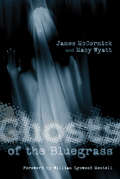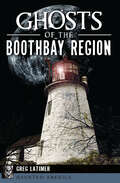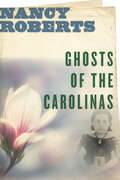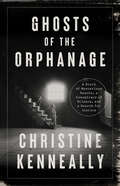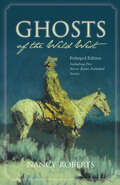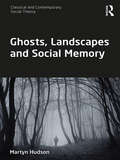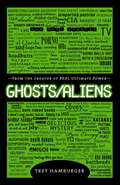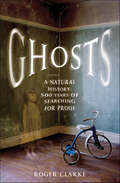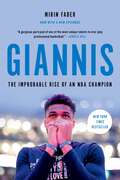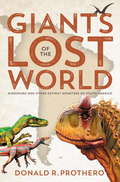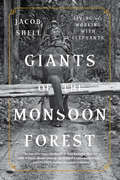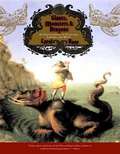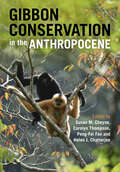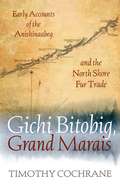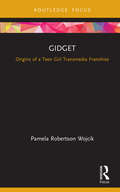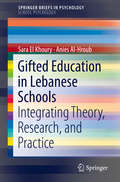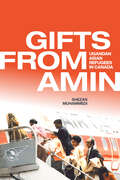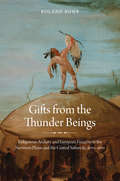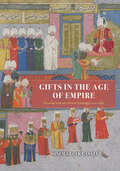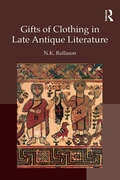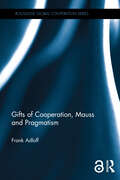- Table View
- List View
Ghosts of the Bluegrass
by James McCormick Macy WyattAn anthology of chilling ghost stories and death lore collected from central Kentucky.In Ghosts of the Bluegrass, James McCormick and Macy Wyatt present stories of Kentucky ghosts, past and present. Some of the tales are set in rural areas, but many take place in urban areas such as the haunted house on Broadway in downtown Lexington and in buildings on the University of Kentucky campus, where Adolph Rupp is said to have conversed with the deceased biology professor Dr. Funkhouser. This volume contains chapters on haunted places, poltergeists, communication with the dead, and ghosts who linger to resolve unfinished business from their past lives, as well as a chapter about ghosts who reveal themselves through lights, changes in temperature, or sound. The book even features a chilling account by a nineteenth-century family haunted in their Breckinridge County home. Whether witnesses believe that a spirit has come to protect those it left behind or to complete an unfinished task, ghostly appearances remain a mystery. As McCormick and Wyatt point out, there are no right or wrong answers when it comes to the supernatural. One thing is certain: these tales will bring pleasure and perhaps a goose bump or two to the reader interested in ghost stories and folklore in the Kentucky tradition.Praise for Ghosts of the Bluegrass“Bell witch stories, ghostly dogs, campus ghosts, rattling chains—all are here, with titles like “The Gray Lady of Liberty Hall” and “Family Banshee Foretells Deaths.” In sum, this is a fine anthology with extremely interesting and readable ghost stories, worth reading for the charm of the stories themselves.” —Journal of Folklore Research“I felt like I was there sitting down with some of the area’s best storytellers, hearing authentic stories. McCormick and Wyatt have done a tremendous service to current readers and to future generations by preserving this important part of our heritage.” —Roberta Simpson Brown, author of The Walking Trees and Other Scary Stories and Queen of the Cold-Blooded Tales“The compilers have done an excellent job of editing, inserting helpful explanatory or historic notes to add to information on a particular story, and giving cross references for like stories.” —Kentucky Kaleidoscope
Ghosts of the Boothbay Region (Haunted America)
by Greg LatimerThe pine-forested rocky coast from Boothbay to Southport hides dark mysteries and eerie haunts. Meet the ghosts of Mainers past who just could not leave this picturesque shore life, even in death. The soul of a lighthouse keeper's wife seems to linger on Burnt Island. The spirits of the Opera House remain hidden behind the curtain but come out to play when the living are away. One local might even have returned from the grave to greet his neighbors on a brisk spring afternoon. Investigative reporter Greg Latimer takes a journey to the Boothbay region's haunted side, where the ethereal residents are unrestrained by mortal bonds.
Ghosts of the Carolinas
by Nancy RobertsNorth and South Carolina are steeped in history—some of it supernatural. The “custodian of the twilight zone” shares their spookiest tales (Southern Living).Nancy Roberts, known as the “First Lady of American Folklore,” is a topnotch storyteller and one of the few who both write and tell their own stories. For more than two decades, Ms. Roberts has documented ghost stories and interviewed hundreds of people throughout the United States.A nationally known author of twenty-three books, Ms. Roberts began her career with a series of ghost stories written for The Charlotte Observer. Carl Sandburg sent her word that her stories were good, suggesting “they should be a book.” Since then her books have won her a certificate of commendation from the American Association for State and Local History and a nomination for the Great Western Writer’s Spur Award.Ms. Roberts has a special love for encounters with Southern specters. A native of North Carolina, she grew up listening to the ghost stories of the Old South. In this collection of her favorites, Ms. Roberts tells of the phantoms who haunt the Carolinas and the people who have witnessed their appearances firsthand.Praise for Nancy Roberts“Just about everybody likes a good ghost story. And ghost hunter/author Nancy Roberts has put together as shivery a selection of other worldly tales as you’re likely to find anywhere . . . And whether you believe in ghosts or not, these tales are guaranteed to give you a chill, especially before you go into a dark room alone.” —Southern Living
Ghosts of the Orphanage: A Story of Mysterious Deaths, a Conspiracy of Silence, and a Search for Justice
by Christine KenneallyThe shocking secret history of twentieth-century orphanages—which for decades hid violence, abuse, and deaths within their walls For much of the twentieth century, a series of terrible events—abuse, both physical and psychological, and even deaths—took places inside orphanages. The survivors have been trying to tell their astonishing stories for a long time, but disbelief, secrecy, and trauma have kept them from breaking through. For ten years, Christine Kenneally has been on a quest to uncover the harrowing truth. Centering her story on St. Joseph&’s, a Catholic orphanage in Vermont, Kenneally has written a stunning account of a series of crimes and abuses. But her work is not confined to one place. Following clues that take her into the darkened corners of several institutions across the globe, she finds a trail of terrifying stories and a courageous group of survivors who are seeking justice. Ghosts of the Orphanage is an incredible true crime story and a reckoning with a past that has stayed buried for too long, with tragic consequences.
Ghosts of the Wild West
by Nancy RobertsSeventeen tales of untamed spirits in the newly expanded edition of the Spur Award finalist from the “custodian of the twilight zone” (Southern Living).In these seventeen ghostly tales—including five new stories—Roberts expertly guides readers through eerie encounters and harrowing hauntings across Kansas, Montana, Wyoming, Colorado, Arizona, New Mexico, Texas, and the Dakotas. Along the way her accounts intersect with the lives (and afterlives) of legendary figures such as Wild Bill Hickok, Wyatt Earp, Bat Masterson, and Doc Holliday. Roberts also justifies the fascination among ghost hunters, folklorists, and interested tourists with notoriously haunted locales such as Deadwood, Tombstone, and Abilene through her tales of paranormal legends linked to these gunslinger towns synonymous with violence and vice in Western lore. But not all of these encounters feature frightening specters or wandering souls. Roberts also details episodes of animal spirits, protective presences, and supernatural healings.Forever destined to be associated with adventure, romance, and risk taking, the Wild West of yore still haunts the American imagination. Roberts reminds us here that our imaginations aren’t the only places where restless ghosts still roam.“Tales of vaporous ghost lights, haunted mesas, phantom gunmen, and reanimated skeletons. It’s a book sure to please collectors of Western lore, fans of well-told, old-fashioned ghost tales and, it would seem to me, school librarians looking for just the right book to introduce middle school and high school readers to American folklore.” —Michael Norman, author of Haunted Heartland
Ghosts, Landscapes and Social Memory (Classical and Contemporary Social Theory)
by Martyn HudsonThis book is a groundbreaking attempt to rethink the landscapes of the social world and historical practice by theorising ‘social haunting’: the ways in which the social forms, figures, phantasms and ghosts of the past become present to us time and time again. Examining the relationship between historical practices such as archaeology and archival work in order to think about how the social landscape is reinvented with reference to the ghosts of the past, the author explores the literary and historical status and accounts of the ghost, not for what they might tell us about these figures, but for their significance for our, constantly re-invented, re-vivified, re-ghosted social world. With chapters on haunted houses and castles, slave ghosts, the haunting airs of music, the prehistoric origin of spirits, Marxist spectres, Freudian revenants, and the ghosts in the machine, Ghosts, Landscapes and Social Memory adopts multi-disciplinary methods for understanding the past, the dead and social ghosts and the landscapes they appear in. A sociology of haunting that illustrates how social landscapes have their genesis and perpetuation in haunting and the past, this volume will appeal to sociologists and social theorists with interests in memory, haunting and culture.
Ghosts/Aliens
by Trey Hamburger"The X-Files" meets "The Hitchhiker's Guide to the Galaxy" in a 17-year-old's weeklong investigation into extraterrestrial and paranormal activity--including aliens with flippers and teleporting Hot Pockets. 25 line drawings.
Ghosts: A Natural History: 500 Years of Seaching for Proof
by Roger ClarkeA New York Times Book Review Editor's ChoiceA comprehensive, authoritative and readable history of the evolution of the ghost in the west, examining the behavior of the subject in its preferred environment: the stories we tell each other."Roger Clarke tells this [the story that inspired Henry James' The Turn of the Screw] and many other gloriously weird stories with real verve, and also a kind of narrative authority that tends to constrain the skeptical voice within... [An] erudite and richly entertaining book." —New York Times Book ReviewNo matter how rationally we order our lives, few of us are completely immune to the suggestion of the uncanny and the fear of the dark. What explains sightings of ghosts? Why do they fascinate us? What exactly do those who have been haunted see? What did they believe? And what proof is there?Taking us through the key hauntings that have obsessed the world, from the true events that inspired Henry James's classic The Turn of the Screw right up to the present day, Roger Clarke unfolds a story of class conflict, charlatans, and true believers. The cast list includes royalty and prime ministers, Samuel Johnson, John Wesley, Harry Houdini, and Adolf Hitler. The chapters cover everything from religious beliefs to modern developments in neuroscience, the medicine of ghosts, and the technology of ghosthunting. There are haunted WWI submarines, houses so blighted by phantoms they are demolished, a seventeenth-century Ghost Hunter General, and the emergence of the Victorian flash mob, where hundreds would stand outside rumored sites all night waiting to catch sight of a dead face at a window.Written as grippingly as the best ghost fiction, A Natural History of Ghosts takes us on an unforgettable hunt through the most haunted places of the last five hundred years and our longing to believe.
Giambattista Vico on Natural Law: Rhetoric, Religion and Sensus Communis
by John SchaefferThis book introduces the thought of Giambattista Vico (1668-1744) into the discussion about natural law. For many critics, natural law is not natural but a façade behind which lurks the supernatural – that is, revealed religion. While current notions of natural law are based on either Aristotelian/Thomistic principles or on Enlightenment rationalism, the book shows how Vico was the only natural law thinker to draw on the Roman legal tradition, rather than on Greek or Enlightenment philosophy. Specifically, the book addresses how Vico, drawing his inspiration from Roman history, incorporated both rhetoric and religion into a dynamic concept of natural law grounded in what he called the sensus communis: the entire repertoire of values, images, institutions, and even prejudices that a community takes for granted. Vico denied that natural law could ever furnish a definitive answer to moral problems in the social/public sphere. Rather he maintained that such problems had to be debated in the wider arena of the sensus communis. For Vico, as this book argues, natural law principles emerged from these debates; they did not resolve them.
Giannis: The Improbable Rise of an NBA MVP
by Mirin FaderThe story of Giannis Antetokounmpo's extraordinary rise from poverty in Athens, Greece to super-stardom in America with the Milwaukee Bucks—becoming one of the most transcendent players in history and an NBA champion—from award-winning basketball reporter and feature writer at The Ringer Mirin Fader, touching on universal themes of family, immigration, hard work, wealth, loss, and dreaming big. As the face of the NBA's new world order, Giannis Antetokounmpo has overcome unfathomable obstacles to become a symbol of hope for people all over the world, the personification of the American Dream. <P><P> But his backstory remains largely untold, and Fader unearths new information about the childhood that shaped "The Greek Freak"—from sleeping side by side with his brothers to selling trinkets on the side of the street with his family to the racism he experienced in Greece. Antetokounmpo grew up in an era when Golden Dawn, Greek's far-right, anti-immigrant party, patrolled his neighborhood, and his status as an illegal immigrant largely prevented him from playing for Greek's top clubs, making his rise to the NBA all the more improbable. Fader tells a deeply-human story of how an unknown, skinny, Black-Greek teen, who played in the country's lowest pro division and was seen as a draft gamble, transformed his body and his game into MVP material. <P><P>Antetokounmpo's story has been framed as a feel-good narrative in which the globe has embraced him, watching him grow up and lead the underdog Bucks to the NBA Championship in 2021. <P><P>Giannis reveals a more nuanced story: how hesitant Antetokounmpo was, and still is, to spend money; how lonely and isolated he felt, adjusting to America and the NBA early in his career; the way he changed after his father recently died of a heart attack; the complexity of grappling with his Black and Greek identities; how private he is, so hard on himself and his shortcomings, a drive that fuels him every day; and the deep-rooted responsibility he feels to be a nurturing role model for his younger brothers. <P><P>Fader illustrates a more vulnerable star than people know, a person who has evolved triumphantly into all of his roles: as father, brother, son, teammate, and global icon. Giannis gives readers a front-row seat as Antetokounmpo strives for an elusive championship with the Bucks, quelling speculation about potentially leaving Milwaukee after signing a five-year supermax contract extension worth $228 million. Now, he contends with his next big hurdle: proving that committing to a small-market franchise can bring Milwaukee back to glory. <P><P><B>A New York Times Best Seller</b>
Giants of the Lost World: Dinosaurs and Other Extinct Monsters of South America
by Donald R. ProtheroMore than a hundred years ago, Sir Arthur Conan Doyle wrote a novel called The Lost World with the exciting premise that dinosaurs and other prehistoric beasts still ruled in South America. Little did Conan Doyle know, there were terrifying monsters in South America--they just happened to be extinct. In fact, South America has an incredible history as a land where many strange creatures evolved and died out. In his book Giants of the Lost World: Dinosaurs and Other Extinct Monsters of South America, Donald R. Prothero uncovers the real science and history behind this fascinating story. The largest animal ever discovered was the huge sauropod dinosaur Argentinosaurus, which was about 130 feet long and weighed up to 100 tons. The carnivorous predator Giganotosaurus weighed in at more than 8 tons and measured more than 47 feet long, dwarfing the T. rex in comparison. Gigantic anacondas broke reptile records; possums evolved into huge saber-toothed predators; and ground sloths grew larger than elephants in this strange, unknown land. Prothero presents the scientific details about each of these prehistoric beasts, provides a picture of the ancient landscapes they once roamed, and includes the stories of the individuals who first discovered their fossils for a captivating account of a lost world that is stranger than fiction.
Giants of the Monsoon Forest: Living And Working With Elephants
by Jacob ShellA journey through the hidden world of elephants and their riders. High in the mountainous rainforests of Burma and India grow some of the world’s last stands of mature, wild teak. For more than a thousand years, people here have worked with elephants to log these otherwise impassable forests and move people and goods (often illicitly) under cover of the forest canopy. In Giants of the Monsoon Forest, geographer Jacob Shell takes us deep into this strange elephant country to explore the lives of these extraordinarily intelligent creatures. The relationship between elephant and rider is an intimate one that lasts for many decades. When an elephant is young, he or she is paired with a rider, who is called a mahout. The two might work together their entire lives. Though not bred to work with humans, these elephants can lift and carry logs, save people from mudslides, break logjams in raging rivers, and navigate dense mountain forests with passengers on their backs. Visiting tiny logging villages and forest camps, Shell describes fascinating characters, both elephant and human—like a heroic elephant named Maggie who saves dozens of British and Burmese refugees during World War II, and an elephant named Pak Chan who sneaks away from the Ho Chi Minh Trail to mate with a partner in a passing herd. We encounter an eloquent colonel in a rebel army in Burma’s Kachin State, whose expertise is smuggling arms and valuable jade via elephant convoy, and several particularly smart elephants, including one who discovers, all on his own, how to use a wood branch as a kind of safety lock when lifting heavy teak logs. Giants of the Monsoon Forest offers a new perspective on animal intelligence and reveals an unexpected relationship between evolution in the natural world and political struggles in the human one. Shell examines why the complex tradition of working with elephants has endured with Asian elephants, but not with their counterparts in Africa. And he shows us how Asia’s secret forest culture might offer a way to save the elephants. By performing rescues after major floods—as they did in the wake of the 2004 Indian Ocean tsunami—and helping sustainably log Asian forests, humans and elephants working together can help protect the fragile spaces they both need to survive.
Giants, Monsters, and Dragons: An Encyclopedia of Folklore, Legend and Myth
by Carol RoseA comprehensive and fascinating collection of mythical beasts and strange beings from around the world, in their cultural context.
Gibbon Conservation in the Anthropocene
by Helen J. Chatterjee Susan M. Cheyne Carolyn Thompson Peng-Fei FanHylobatids (gibbons and siamangs) are the smallest of the apes distinguished by their coordinated duets, territorial songs, arm-swinging locomotion, and small family group sizes. Although they are the most speciose of the apes boasting twenty species living in eleven countries, ninety-five percent are critically endangered or endangered according to the IUCN's Red List of Threatened Species. Despite this, gibbons are often referred to as being 'forgotten' in the shadow of their great ape cousins because comparably they receive less research, funding and conservation attention. This is only the third book since the 1980s devoted to gibbons, and presents cutting-edge research covering a wide variety of topics including hylobatid ecology, conservation, phylogenetics and taxonomy. Written by gibbon researchers and practitioners from across the world, the book discusses conservation challenges in the Anthropocene and presents practice-based approaches and strategies to save these singing, swinging apes from extinction.
Gichi Bitobig, Grand Marais: Early Accounts of the Anishinaabeg and the North Shore Fur Trade
by Timothy CochraneThe journals of two clerks of the American Fur Company recall a lost moment in the history of the fur trade and the Anishinaabeg along Lake Superior&’s North Shore Long after the Anishinaabeg first inhabited and voyageurs plied Lake Superior&’s North Shore in Minnesota, and well before the tide of Scandinavian immigrants swept in, Bela Chapman, a clerk of John Jacob Astor&’s American Fur Company, fetched up in Gichi Bitobig—a stony harbor now known as Grand Marais. Through the year that followed, Chapman recorded his efforts on behalf of Astor&’s enterprise: setting up a working post to compete with the Hudson Bay Company, establishing trading relationships with the local Anishinaabeg, and steering a crew of African-Anishinaabeg, Yankee, Virginian, and Métis boatmen. The young clerk&’s journal, and another kept by his successor, George Johnston, provides a window into a story largely lost to history. Using these and other little known documents, Timothy Cochrane recreates the drama that played out in the cold weather months in Grand Marais between 1823 and 1825.In its portrayal of the changing fur trade on the great lake, Gichi Bitobig, Grand Marais offers a rare glimpse of the Anishinaabeg—especially the leader Espagnol—as astute and active trading partners, playing the upstart Americans for competitive advantage against their rivals, even as the company men contend with the harsh geographic realities of the North Shore. Through the words of long-ago witnesses, the book recovers both the too-often overlooked Anishinaabeg roots and corporate origins of Grand Marais, a history deeper and more complex than is often told. Gichi Bitobig, Grand Marais recalls a time in northern Minnesota when men of the American Fur Company and the Anishinaabeg navigated the shifting course of progress, negotiating the new perils and prospects of commerce&’s westward drift.
Gichigami Hearts: Stories and Histories from Misaabekong
by Linda LeGarde GroverAward-winning author Linda LeGarde Grover interweaves family and Ojibwe history with stories from Misaabekong (the place of the giants) on Lake Superior Long before there was a Duluth, Minnesota, the massive outcropping that divides the city emerged from the ridge of gabbro rock running along the westward shore of Lake Superior. A great westward migration carried the Ojibwe people to this place, the Point of Rocks. Against this backdrop—Misaabekong, the place of the giants—the lives chronicled in Linda LeGarde Grover&’s book unfold, some in myth, some in long-ago times, some in an imagined present, and some in the author&’s family history, all with a deep and tenacious bond to the land, one another, and the Ojibwe culture.Within the larger history, Grover tells the story of her ancestors&’ arrival at the American Fur Post in far western Duluth more than two hundred years ago. Their fortunes and the family&’s future are inextricably entwined with tales of marriages to voyageurs, relocations to reservation lands, encounters with the spirits of the lake and wood creatures, the renewal of life—in myth and in art, the search for meaning in the transformations of our day is always vital. Finally, in one man&’s struggles, age-old tribulations, the intergenerational traumas of extended families and communities, and a uniquely Ojibwe appreciation for the natural and spiritual worlds converge, forging the Ojibwe worldview and will to survive as his legacy to his descendants.Blending the seen and unseen, the old and the new, the amusing and the tragic and the hauntingly familiar, this lyrical work encapsulates a way of life forever vibrant at the Point of Rocks.
Gidget: Origins of a Teen Girl Transmedia Franchise (Cinema and Youth Cultures)
by Pamela Robertson WojcikGidget: Origins of a Teen Girl Transmedia Franchise examines the multiplicity of books, films, TV shows, and merchandise that make up the transmedia Gidget universe from the late 1950s to the 1980s. The book examines the Gidget phenomenon as an early and unique teen girl franchise that expands understanding of both teen girlhood and transmedia storytelling. It locates the film as existing at the historical intersection of numerous discourses and events, including the emergence of surf culture and surf films; the rise of California as signifier of modernity and as the epicentre of white American middle-class teen culture; the annexation of Hawaii; the invention of Barbie; and Hollywood’s reluctant acceptance of teen culture and teen audiences. Each chapter places the Gidget text in context, looking at production and reception circumstances and intertexts such as the novels of Françoise Sagan, the Tammy series, La Dolce Vita, and The Patty Duke Show, to better understand Gidget’s meaning at different points in time. This book explores many aspects of Gidget, providing an invaluable insight into this iconic franchise for students and researchers in film studies, feminist media studies, and youth culture.
Gift-Giving in Japan: Cash, Connections, Cosmologies
by Katherine RuppGift-giving is extremely important in Japanese society, not only at personal and household levels, but at the national and macroeconomic levels as well. This book is the first in English to document the extraordinary scale, complexity, and variation of giving in contemporary Japan. Gift-Giving in Japan is based on eighteen months' fieldwork in the Tokyo metropolitan area, as well as short-term research in other parts of Japan. The core of the study is the experience of family representatives of different ages, classes, genders, occupations, neighborhoods, and religions. The author also interviewed experts, including the author of gift-giving etiquette books, Buddhist and Shinto priests, department store and funeral home employees, and workers at Tokyo's Tsukiji fish market. She participated in neighborhood festivals, election rallies, house-building rites, and other ceremonies of which gift-giving was an integral part. Recent anthropological interest in drawing a strong contrast between commodities and gifts both reflects and reinforces the conception of the gift as part of the giver and the related distinction between the realm of the gift and the realm of the marketplace. The author argues that Japanese practices of giving and receiving challenge assumptions related to this idea of the gift.
Gifted Education in Lebanese Schools: Integrating Theory, Research, And Practice (SpringerBriefs in Psychology)
by Anies Al-Hroub Sara El KhouryThis Brief discusses research about gifted education in Lebanese schools. It provides an overview of the latest theories, definitions, and practices used to identify gifted students in Lebanese schools. Chapters begin by providing background information on the status of gifted education in Lebanon and the challenges gifted Lebanese children face. Subsequent chapters discuss recent and relevant international definitions of giftedness as well as common misconceptions and underrepresentation of giftedness. The Brief presents research study findings on the cultural definition of giftedness in the minds of Lebanese teachers. It also presents findings on current practices used to identify gifted learners in Lebanese schools. It concludes with recommendations from the teachers that participated in the reported study as well as the authors’ proposal for a Lebanese elementary school policy for identification of gifted students. Gifted Education in Lebanese Schools is an informative resource for researchers, professionals, practitioners, and graduate students in the field of school psychology, educational psychology, gifted and special education, and social work.
Gifts and Commodities: Exchange and Western Capitalism Since 1700 (Material Cultures)
by James G. CarrierThree hundred years ago people made most of what they used, or got it in trade from their neighbours. Now, no one seems to make anything, and we buy what we need from shops. Gifts and Commodities describes the cultural and historical process of these changes and looks at the rise of consumer society in Britain and the United States. It investigates the ways that people think about and relate to objects in twentieth-century culture, at how those relationships have developed, and the social meanings they have for relations with others. Using aspects of anthropology and sociology to describe the importance of shopping and gift-giving in our lives and in western economies, Gifts and Commodities: * traces the development of shopping and retailing practices, and the emergence of modern notions of objects and the self * brings together a wealth of information on the history of the retail trade * examines the reality of the distinctions we draw between the impersonal economic sphere and personal social sphere * offers a fully interdisciplinary study of the links we forge between ourselves, our social groups and the commodities we buy and give.
Gifts from Amin: Ugandan Asian Refugees in Canada (Studies in Immigration and Culture #18)
by Shezan MuhammediIn August 1972, military leader and despot Idi Amin expelled Asian Ugandans from the country, professing to return control of the economy to “Ugandan citizens.” Within ninety days, 50,000 Ugandans of South Asian descent were forced to leave and seek asylum elsewhere; nearly 8,000 resettled in Canada. This major migration event marked the first time Canada accepted a large group of predominantly Muslim, non-European, non-white refugees. Shezan Muhammedi’s Gifts from Amin documents how these women, children, and men—including doctors, engineers, business leaders, and members of Muhammedi’s own family—responded to the threat in Uganda and rebuilt their lives in Canada. Building on extensive archival research and oral histories, Muhammedi provides a nuanced case study on the relationship between public policy, refugee resettlement, and assimilation tactics in the twentieth century. He demonstrates how displaced peoples adeptly maintain multiple regional, ethnic, and religious identities while negotiating new citizenship. Not passive recipients of international aid, Ugandan Asian refugees navigated various bureaucratic processes to secure safe passage to Canada, applied for family reunification, and made concerted efforts to integrate into—and give back to—Canadian society, all the while reshaping Canada’s refugee policies in ways still evident today. As the numbers of forcibly displaced people around the world continue to rise, Muhammedi’s analysis of policymaking and refugee experience is eminently relevant. The first major oral history project dedicated to the stories of Ugandan Asian refugees in Canada, Gifts from Amin explores the historical context of their expulsion from Uganda, the multiple motivations behind Canada’s decision to admit them, and their resilience over the past fifty years.
Gifts from the Thunder Beings: Indigenous Archery and European Firearms in the Northern Plains and Central Subarctic, 1670-1870
by Roland BohrGifts from the Thunder Beings examines North American Aboriginal peoples’ use of Indigenous and European distance weapons in big-game hunting and combat. Beyond the capabilities of European weapons, Aboriginal peoples’ ways of adapting and using this technology in combination with Indigenous weaponry contributed greatly to the impact these weapons had on Aboriginal cultures. This gradual transition took place from the beginning of the fur trade in the Hudson’s Bay Company trading territory to the treaty and reserve period that began in Canada in the 1870s.Technological change and the effects of European contact were not uniform throughout North America, as Roland Bohr illustrates by comparing the northern Great Plains and the Central Subarctic—two adjacent but environmentally different regions of North America—and their respective Indigenous cultures. Beginning with a brief survey of the subarctic and Northern Plains environments and the most common subsistence strategies in these regions around the time of contact, Bohr provides the context for a detailed examination of social, spiritual, and cultural aspects of bows, arrows, quivers, and firearms. His detailed analysis of the shifting usage of bows and arrows and firearms in the northern Great Plains and the Central Subarctic makes Gifts from the Thunder Beings an important addition to the canon of North American ethnology.
Gifts in the Age of Empire: Ottoman-Safavid Cultural Exchange, 1500–1639 (Silk Roads)
by Sinem Arcak CasaleExplores the Safavid and Ottoman empires through the lens of gifts. When the Safavid dynasty, founded in 1501, built a state that championed Iranian identity and Twelver Shi'ism, it prompted the more established Ottoman Empire to align itself definitively with Sunni legalism. The political, religious, and military conflicts that arose have since been widely studied, but little attention has been paid to their diplomatic relationship. Sinem Arcak Casale here sets out to explore these two major Muslim empires through a surprising lens: gifts. Countless treasures—such as intricate carpets, gilded silver cups, and ivory-tusk knives—flowed from the Safavid to the Ottoman Empire throughout the sixteenth century. While only a handful now survive, records of these gifts exist in court chronicles, treasury records, poems, epistolary documents, ambassadorial reports, and travel narratives. Tracing this elaborate archive, Casale treats gifts as representative of the complicated Ottoman-Safavid coexistence, demonstrating how their rivalry was shaped as much by culture and aesthetics as it was by religious or military conflict. Gifts in the Age of Empire explores how gifts were no mere accessories to diplomacy but functioned as a mechanism of competitive interaction between these early modern Muslim courts.
Gifts of Clothing in Late Antique Literature
by Nikki RollasonBoth clothing and gifts in the ancient world have separately been the subject of much scholarly discussion because they were an integral part of Greek and Roman society and identity, creating and reinforcing the relationships which kept a community together, as well as delineating status and even symbolising society as a whole. They have, however, rarely been studied together despite the prevalence of clothing gifts in many ancient texts. This book addresses a gap in scholarship by focusing on gifts of elite male clothing in late antique literature in order to show that, when they appeared in texts, these items were not only functioning in an historical or 'real-life' sphere but also as a literary space within which authors could discuss ideas of social relationships and authority. This book suggests that authors used items which usually formed part of the costume of authority of the period - the trabea of the consul, the chlamys of the imperial court and the emperor, and the pallium of the Christian bishops - to 'over-write' wearers and donors as confident figures of 'official' authority when this may have been open to doubt.
Gifts of Cooperation, Mauss and Pragmatism (Routledge Global Cooperation Series)
by Frank AdloffThis book focuses on the contribution of Marcel Mauss (1872-1950) to social theory and a theory of cooperation. It shows that Mauss’s essay "The Gift" (1925) can be seen as a classic of a pragmatist, interactionist and anti-utilitarian sociology. It critiques the dichotomy of self-interest and normatively orientated action that forms the basis of sociology. This conceptual dichotomization has caused forms of social interaction (that cannot be localized either on the side of self-interest or on that of morality) to be overlooked or taken little notice of. The book argues that it is the logic of the gift and its reciprocity that accompany and structure all forms of interaction, from the social micro to the macro-level. It demonstrates that in modern societies agonistic and non-agonistic gifts form their own orders of interaction. This book uniquely establishes the paradigm of the gift as the basis for a theory of interaction. It will be of great interest to researchers and postgraduates in social theory, cultural theory, political sociology and global cooperation, anthropology, philosophy and politics.
